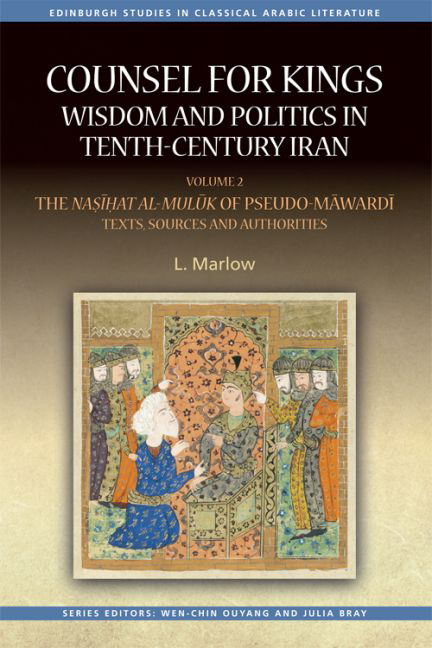 Counsel for Kings: Wisdom and Politics in Tenth-Century Iran
Counsel for Kings: Wisdom and Politics in Tenth-Century Iran 3 - The King's Self-governance
from Part II - The Three Governances: Translations and Commentary
Published online by Cambridge University Press: 07 October 2017
Summary
Chapters 3, 4 and 5 of this volume address Naṣīḥat al-mulūk's three central chapters, devoted to the king's ‘governance’ (siyāsa) of his self (nafs), his elites (khāṣṣa) and the general population (ʿāmma). Coinciding with the Aristotelian divisions of practical philosophy into ethics, economics and politics, subjects that concerned the Arabic- and Persian-speaking elites no less than their Graeco-Roman predecessors, the three ‘governances’ recur in the writings of the Kindian tradition, and would find expression in al-Khwārazmī's classification under ‘practical philosophy’ (al-falsafa al-ʿamaliyya) of three types of management (tadbīr): tadbīr al-rajul nafsahu, ‘a man's management of himself’, that is, the science of moral dispositions (ʿilm al-akhlāq); tadbīr al-khāṣṣa, management of the elites, that is, management of the household (tadbīr al-manzil); and tadbīr al-ʿāmma, management of the common people, that is, governance of the city, the community and dominion (siyāsat al-madīna wa-l-umma wa-l-mulk).
The present chapter addresses Pseudo-Māwardī's centrally placed (fifth) and longest chapter, devoted to the king's ‘governance and discipline of the self’ (siyāsat al-nafs wa-riyā∂atuhā). The paired terms siyāsa and riyā∂a evoke training and discipline, in this case, of the lower self, the self that constituted the seat of the appetites; al-Oakīm al-Tirmidhī, Pseudo-Māwardī's contemporary and fellow resident of the region adjoining the Oxus, wrote a pair of treatises entitled Kitāb al-Riyā∂a (‘Book of [Spiritual] Discipline’) and Kitāb Adab al-nafs (‘Book of the Training of the Self’). Pseudo- Māwardī's fifth chapter displays another important intertextual relationship with Risālat al-maʿāsh wa-l-maʿād (‘Epistle on This Life and the Afterlife’), also known as al-Akhlāq al-maamūda wa-l-madhmūma (‘Praiseworthy and Blameworthy Characteristics’), the work of his admired Muʿtazilite predecessor al-JāaiO, who had, in that text, also enjoined ‘discipline of the self’.
The three chapters presented in Part II display Pseudo-Māwardī's technique of enumerating his points, and sometimes subsections of a point. By using numbers, Pseudo-Māwardī gave his chapters a clear structure and provided signposts for his audience.
- Type
- Chapter
- Information
- Counsel for Kings: Wisdom and Politics in Tenth-Century IranThe Nasihat al-muluk of Pseudo-Mawardi: Texts, Sources and Authorities, pp. 73 - 138Publisher: Edinburgh University PressPrint publication year: 2016


